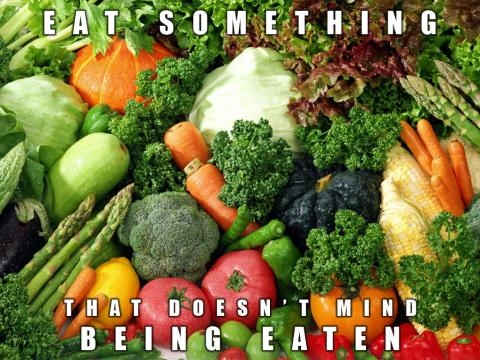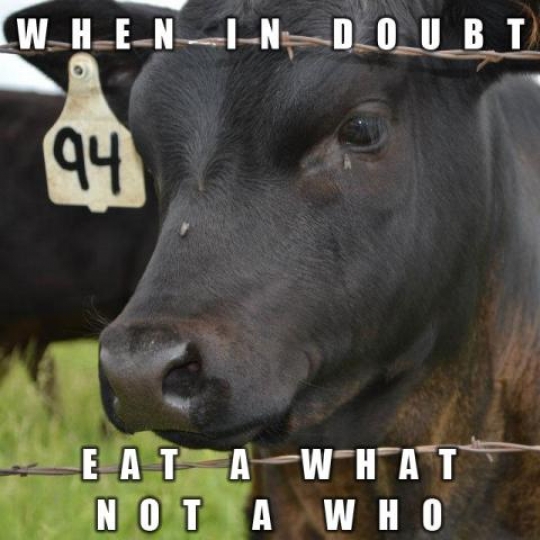I grew up hating the use of pathos in argument. I always thought that we should accept an argument on its merits, not because we liked it, certainly not because we liked the speaker.
But as an activist, I've come to realize that people aren't usually rational. We do what we want to do, not what we abstractly think we should. That is, our feelings about right and wrong inform our actions more than our thoughts about right and wrong. I've realized that for someone to change, you need to help them make an emotional connection to what you're saying. Otherwise they simply won't believe you. They won't believe that what you're saying is important, or accurate, or should have anything to do with their own life. It doesn't matter how good a case you make if the other person doesn't care how good a case you've made.
So let me show some connections between animal rights and issues you may already care about. I'll expand on these and other issues in later posts.
The Environment
Many, but not all, Pagans consider themselves Earth-centered. If we worship the earth, or gods of the earth, or just care about the world we live in, we should be concerned with our own impact on it.
I always try to explain that animal rights/veganism isn't an environmental movement per se. That is, most vegans are vegan out of concern for animals as individuals, not for the environment in general. But that doesn't mean that the environment isn't a completely legitimate reason to eschew animal products. In fact, concern for the environment just might demand it.
Animal agriculture is probably the leading cause of water pollution, which has a range of consequences. These include algal blooms that cause dead areas in the sea, destruction of coral reefs, antibiotic resistance, sedimentation of the coasts, and unsafe drinking water. In nature, animal wastes products would be scattered broadly and absorbed by the system. In nature, there is no waste. The waste of one species is food for another. But now we raise animals in boxes in factories - which is absolutely necessary if we are going to eat meat, because there simply isn't enough land to let animals walk around. This means that animal waste gets concentrated in large reservoirs, which can spill or leak into waterways.
It's not just animal agriculture that's to blame, as pesticides from human produce are also a problem and there are ways for animal raisers to prevent run-off. But as things stand, buying animal products leads directly to toxic runoff. So does eating nonorganic produce, to a lesser extent.
Livestock operations are responsible for 18% of greenhouse gas emissions. It's also the largest cause of rainforest destruction, both to create pastures and grow livestock feed. 62% of cleared rainforest land in Brazil goes to cattle ranching alone.
Up to 77% of ocean fish species are overexploited. Eating fish, whether farmed or wild-caught, is the largest cause of the overtaxing of oceans.
The Food and Agriculture Organization of the United Nations says that "livestock production is one of the major causes of the world's most pressing environmental problems, including global warming, land degradation, air and water pollution, and loss of biodiversity."
Changing the way humans farm animals may help in the long run, but until that happens, every dollar spent on animal products causes more of this to happen.
Feminism
Imagine being told that you're not intelligent or rational, and that because of that, you don't have the same rights as others. Imagine being told that you're an object for someone else's desires. If you're a woman, maybe you don't have to imagine.
In 1792 Mary Wollstonecraft published the book Vindications of the Rights of Woman, one of the first works of feminist philosophy, as a follow up to her 1970 book on the rights of men. The satirical Vindication of the Rights of Brutes was written in response. It argued that the then-new idea of human rights, popularized by Wollstonecraft and Thomas Paine, inevitably led to the ridiculous idea that animals, too, must have rights. Since that idea was patently ridiculous, the idea that all men, and even women, had rights must also be ridiculous.
Women's rights and human rights might seem obvious now, but activists fought hard for it and the work is still not done. One of the central points held in common by feminists and human rights activists is that we all have rights based on our ability to think and to feel, not based on whether we look the same, have the same abilities, or are useful to someone else.
The link between animal rights and women's rights isn't just intellectual. Studies now show that slaughterhouse work increases domestic violence, rape and other sex crimes, and other crimes in a community, especially violent crimes. (See end of post for links). It's not that violent or abusive people tend to seek work at slaughterhouses. Slaughterhouse work actually desensitizes people to violence and makes them more violent. It's a terrible, traumatizing experience for the people who work there. By law all purchased meat must come through a slaughterhouse, including humane grass-fed beef raised on a co-op. Therefore, there's a necessary link between purchased meat and domestic abuse, rape, and other violent crimes. We can't have one without the other.
Racial Equality
A crucial ingredient of genocide is the thought that the victims don't deserve better because they aren't fully human. I would say that moral exclusion, or kicking others out of the group of "those that matter," is what allows all social ills to occur. I'm not suggesting that everything in the world gets to be morally regarded. We rightfully exclude things like nuclear waste, bell peppers, rocks, etc. The question is, how do we determine who and what to regard, and what not?
All too often the answer is, "I regard those that are most like me. I don't care about anyone else."
Theodor Adorno says, "Auschwitz begins whenever someone looks at a slaughterhouse and thinks: they’re only animals."
In 1906 a Pygmy man named Ota Benga was displayed in the Bronx Zoo in New York City. He was eventually freed, but committed suicide in 1916. Around the same time, a man named Ishi, the last member of the Yahi Native American tribe, was displayed in California.
People protested Benga's imprisonment. The criticisms were received much the same as modern protests against chimpanzees' imprisonment. They are "merely x," and beneath our concern.
You could say, and people do say, that the problem is that they were humans, not animals. But that isn't saying anything much different than was said of Benga, or whole hosts of people suffering genocide. Essentially, Benga and Ishi weren't in well-regarded groups.
Comparisons between the Holocaust, slavery, and human use of animals generate controversy. Nevermind that Holocaust survivors themselves have made the comparison, such as Alex Hershaft comparing, “the crowding, cattle cars, brutality and the routine and efficiency of mass extermination." Why does this upset people? Well, it's a normal human thing. We don't want to compare our suffering to the suffering of others, because that seems to diminish it. Not to mention, because in this case, we are comparing the suffering of fellow human beings to beings we don't consider our equals. Which, again, we've also said of fellow humans. Unfortunately, controversial statements like this might do more harm than good because while facts are insensitive, activists need not be. Pathos again.
Such terms mean whatever the speaker wants them to mean. Some people use "human" more broadly or narrowly than others. It's just a label of group membership. Discrimination and bias will always exist when we think of others as "merely x," or as members of an arbitrary category. Sure, we need to use labels in order to communicate, but we run the risk of making the label more than it is.
The goal of all abolitionists has been to show that the circle of those deserving moral consideration is larger than people once thought. In the case of racial discrimination, the task was to show that members of the out-group are every bit as human as the perpetrators. In the case of animal rights, the task is to show that non-human animals are beings just as much as we are. But regardless of one's ultimate opinion on that, the same biased process underlies all exploitation: we can do what we want, because they aren't like us.
Social Justice
A hamburger costs about 55 square feet of rainforest to make. Not only are 35 species estimated to go extinct every day due to rainforest clearing, the lives of natives are also in danger. Consider the Awa tribe in Brazil, who only have a few hundred surviving members. Hired guns hunt the tribe members so that their land can be logged, settled, and ranched.
Though the killing of natives is illegal, it's still an indispensible part of cattle ranching. There simply isn't enough unoccupied land to satisfy the market's demand for meat. Besides working to prevent the illegal logging operations, which is not really successful, the other option is to reduce demand.
Around 400 million people in Africa and Southeast Asia depend on fishing, but the ocean is dying due to Western overfishing. Fish farms are a poor solution because they create toxic-runoff that creates more dead zones in the oceans. Though I am advocating a vegan diet, if anyone should be eating fish, it should be the coastal people who depend on it, not the wealthy nations of the world that have other things to eat.
The job of tanning leather is increasingly being exported to poorer countries, where the chemicals used not only endanger the lives of tannery workers, but also endanger the local communities by poisoning the water and soil. The chemicals used in tanning leather are known to cause a host of cancers.
Not a Separate Issue
It's almost mind-boggling how one bundle of habits - eating animal products - has created so much havoc in every corner of the globe. It also gives me cause for hope. With one change, I am able to make a huge difference.
Veganism, it would seem, is not a separate issue, but a coming-together of multiple goals. As a philosophy, it represents a desire for the well-being of all sentient beings, including humans. As a practice, it's the single most important way we can reduce our negative impact on the world.
Sources
Link between slaughter and crime:
http://www.animalstudies.msu.edu/Slaughterhouses_and_Increased_Crime_Rat...
http://www.news.com.au/national/slaughterhouse-workers-are-more-likely-t...
http://cyberactivist.blogspot.com/2003_08_01_archive.html
Link between animal agriculture and environmental damage:
http://water.epa.gov/polwaste/nps/agriculture_facts.cfm
http://www.ncifap.org/
http://www.pewenvironment.org/our-focus/ocean-1080/fisheries-1082
Economic impact of animal agriculture
http://www.washingtonpost.com/wp-dyn/content/article/2008/04/29/AR200804...
http://www.fao.org/ag/magazine/0612sp1.htm
http://www.bbc.com/future/story/20120920-are-we-running-out-of-fish
Health effects of tanneries:
http://www.ncbi.nlm.nih.gov/pmc/articles/PMC3168109/
http://www.worstpolluted.org/projects_reports/display/88




Leave a comment!